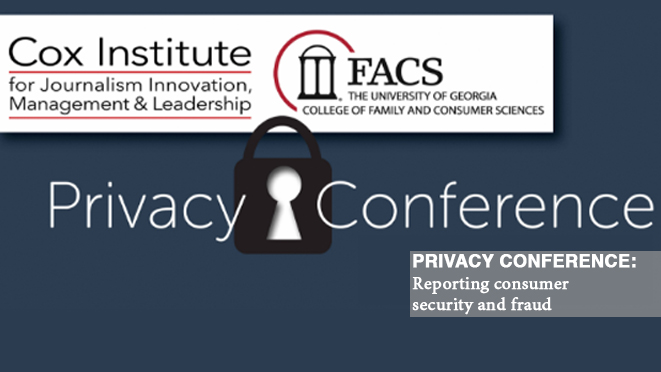Privacy Conference Set to Explore Consumer Issues

Privacy Conference Set to Explore Consumer Issues
Increasing news coverage of identity theft, consumer fraud and emerging technologies like facial recognition and drones make it essential for reporters to understand the intersection of technology and consumer privacy.
The University of Georgia is hosting a privacy conference Sept. 30 so that students in journalism and consumer sciences will be better informed about privacy issues and challenges. The conference is co-sponsored by the College of Family and Consumer Sciences and the James M. Cox Jr. Institute for Journalism Innovation, Management and Leadership at the Grady College of Journalism and Mass Communication.
“Privacy has become an important issue for consumers and journalists,” said Keith Herndon, director of the Cox Institute. “How we think about our personal information and how we report on that information is changing due to social media and the explosion of mobile platforms.”
Peabody Award-winner Bob Sullivan, a consumer journalist, will deliver a kick-off presentation for the day-long conference, followed by a keynote from Adam Levin, author of “Swiped: How to Protect Yourself in a World Full of Scammers, Phishers, and Identity Thieves.”
“Consumers really, really care about their privacy, even if they don’t often act that way,” Sullivan said. “Nearly every story has a privacy angle today, and understanding the complex issues involved will help you skip past the obvious into the important on dozens of stories in the next year or two.”
In the afternoon, Sullivan will moderate a panel featuring Levin and Steve Rosenboro, Cox Media Group’s managing attorney and chief privacy officer.
The conference will conclude with a look at legal issues surrounding privacy, through a panel with Rosenboro, Grady College communication law professor Bill Lee and UGA Law School faculty member Sonja West.
“Finding the right balance between reporting the news and respecting personal privacy can be tricky for journalists,” West said. “I hope people come away from this panel with an understanding of what factors they should consider when deciding whether the public interest in news outweighs the individual’s right to privacy.”
Attendees will be encouraged to share their experiences from the privacy conference using the hashtag #UGAPrivacyCon.